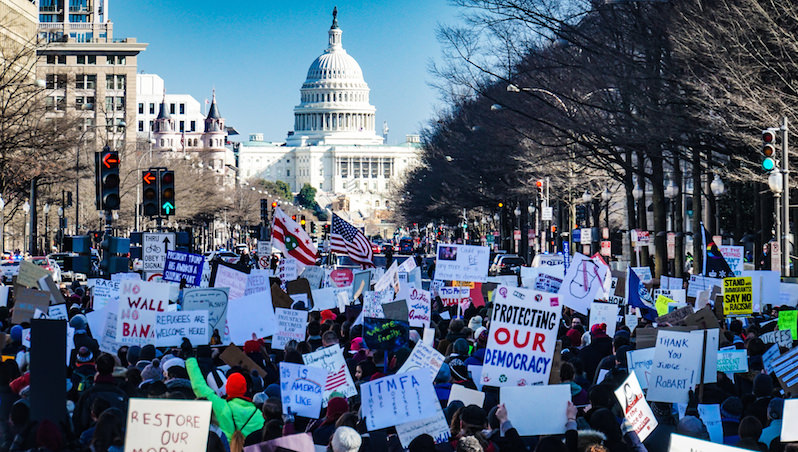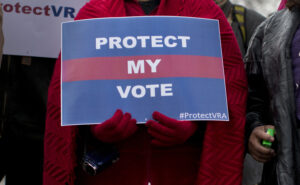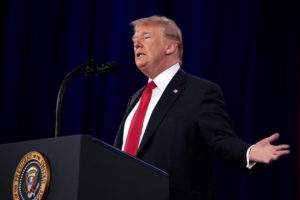What We Do Now
Two new books published in the days leading up to Donald Trump's inauguration purport to show a path forward for liberals.
“What We Do Now: Standing Up for Your Values in Trump’s America” A book edited by Dennis Johnson and Valerie Merians
“The Trump Survival Guide: Everything You Need to Know About Living Through What You Hoped Would Never Happen” A book by Gene Stone
Reviewed by Carlos Lozada
Opponents of President Trump face two battles. The first is against the new administration’s policies and choices — on immigration, education, the environment, the Supreme Court and national security. This is the battle already playing out in street marches and courtroom motions, in federal bureaucracies and legislative bodies. To those waging it, this is the most urgent fight, as Trump’s campaign promises morph into executive orders and appointments. This battle is what is being called, a bit melodramatically but with understandable zeal, the resistance.
The second fight differs in its objectives and time frames. It is more amorphous and easily forgotten, but no less critical. This is the fight over the cultural and economic forces that propelled Trump to the presidency in the first place. It is a battle about jobs, mobility and opportunity; about prejudice, anger and resentment; about understanding, empathy and imagination. This battle is not about saying “that’s not who we are” — it’s about determining whether Americans torn by politics, class and culture can still make common cause about anything.
Published in the days leading up to the 45th president’s inauguration, two new books purport to show a path forward for liberals in Trump’s America. “What We Do Now” is a collection of essays from lefty luminaries — legislators, academics and activists “announcing themselves as the new American resistance movement,” as the introduction declares. “The Trump Survival Guide,” its lesser ambitions clear from its title, warns of the damage Trump might inflict and offers suggestions for how individuals can cope and push back.
These are the first of what will be countless books hoping to guide, chronicle or simply cater to the anti-Trump movement. And if these early works are any indication, the president’s antagonists may be ready for the first battle, but ill-equipped for the second. Their vision tends to be directed inward, their passionate appeals aimed at those already inclined to think like them. That’s one way to do this, I suppose. But if political resistance is going to mean further social retrenchment, then the divisions that bequeathed us Trump — and that seemed to catch the left by such surprise — will only solidify. They will become more resistant.
Alongside pro bono immigration lawyers, a former acting attorney general and the National Park Service, the American Civil Liberties Union has become one of the resistance’s early heroes, and its leaders are well represented in “What We Do Now.” ACLU Executive Director Anthony Romero writes that Trump’s various proposals would violate the Constitution’s First, Fourth, Fifth and Eighth amendments, and he pledges that his organization will “muster all the legal arguments we can to derail the president-elect’s patently anti-civil liberties proposals.” Meanwhile, David Cole, the ACLU’s new legal director, recalls how Americans responded to President George W. Bush’s counterterrorism and detention policies following 9/11: “They protested, filed lawsuits, wrote human rights reports, lobbied foreign audiences and governments to bring pressure to bear on the United States, leaked classified documents, and broadly condemned the administration’s actions as violations of fundamental constitutional and human rights.” As a result, Cole writes, “the course of history changed.”
He is convinced that the same can happen now. The Women’s March on inauguration weekend showcased the magnitude of the discontent, and the decision by a federal judge to halt the deportations of travelers from several Muslim-majority countries under a Trump executive order shows how this new resistance can couple mass protests with nimble legal action. (The ACLU argued the case.)
Some of the 27 contributors to this volume dare to admit that they might work with Trump on some matters. Sen. Elizabeth Warren, D-Mass., asserts that she will fight Trump “every step of the way” if he engages in mass deportations, strips away health insurance or lets loose the wolves of Wall Street. However, “when his goal is to increase the economic security of middle-class families … I will push aside our differences and I will work with him,” she writes. And NAACP President Cornell Williams Brooks says that it’s up to Trump: “Depending upon the new administration’s fidelity to both America’s ideals of liberty and the NAACP’s agenda for justice, we will either be at its side or in its face.”
But many of the contributors are focused on forging connections solely among those people who already abhor Trump, as though the rest of America offers little more than a steady supply of deplorability. “This is the only way forward: local, intersectional organization across movements to protect our communities from hate, racism, and exploitation,” writes Cristina Jimenez, executive director of the immigrant rights organization United We Dream, in a typical passage. “Our journey forward has to start with recommitting to our core values as progressives,” writes NARAL President Ilyse Hogue.
Plenty of conservative activists and intellectuals on the right are appalled by Trump’s ascent. Yet they are absent from this book, as though principled conservatives are not also, in the words of the subtitle, seeking ways to stand up for their values in Trump’s America.
There is much talk of “conversations” in “What We Do Now,” but the talking tends to be one-sided. “Ensuring dignity and a fair shake for all means engaging in authentic conversations to find real community-based solutions,” writes Hogue of those promoting disparate progressive causes. “The values that unite our communities are not in conflict; they’re intertwined. Recognizing these intersections is critical.”
Such conversations, however, are restricted to the chosen. Aside from generalities about how Trump supporters may have voted for him out of a “depth of alienation,” and how no one should “draw broad-brush generalizations” about Americans’ character because of the election, there is little effort in these pages to understand, let alone reach out to, communities beyond the ones the writers represent or endorse. Campaign Zero co-founder Brittany Packnett calls out white people as necessarily “complicit” in America’s culture of hate and mocks their supposedly well-meaning conversations on race. “You don’t get to just have conversations anymore,” she writes. “You don’t get to just wear a safety pin and call yourself an ally. You don’t get to just talk while the rest of us fear for our lives because discrimination, rape culture, and xenophobia just won the White House.”
Author Gene Stone attempts to assuage those deep fears in “The Trump Survival Guide.” He encourages distraught lefties to vote in local elections and the 2018 midterms, donate to liberal causes and activist groups, volunteer on school boards, conserve energy, stand up to bullies, preach intersectionality, instruct benighted relatives on the benefits of Obamacare, complain about Trump on social media, bookmark Alternet and ThinkProgress, and read books by Ta-Nehisi Coates, Rachel Maddow, Naomi Klein, Glenn Greenwald, Arlie Russell Hochschild and Robert Reich. Basically, everything that conscientious upper-middle-class Democrats were already doing.
Perhaps this is the way to “survive” the Trump era — resist the red-state philistines by closing your life and mind off from them, and repeat “this is not normal” again and again. But there is very little in such admonitions that will help you understand why tens of millions of fellow citizens would see the world any differently than you do or have priorities other than your own. It is possible to worry so much about Trump’s America that you forget Trump’s Americans.
In his introduction to “What We Do Now,” volume co-editor Dennis Johnson writes of the widespread “despair,” “grief” and “disillusionment” that followed the election. There is anger, too. “Stay OUTRAGED,” writes Linda Sarsour, executive director of the Arab American Association of New York. “Perpetual outrage is what’s going to fuel our movement right now.” There is little thought given to the despair, grief, disillusionment and anger that preceded the vote, that may have compelled people who once (or twice) supported Barack Obama to cast their lot with Trump. If the resistance is to grow beyond the already converted, if it is to engage in that second battle, it will need some of those people, too. You know, “stronger together” and all that.
Two essays in “What We Do Now,” tucked together at the end of the book, take on that challenge. Novelist Dave Eggers shares his post-election travels through Kentucky, Pennsylvania and Michigan, where he talked with voters, students and immigrants about their hopes and motivations. And Nato Thompson, artistic director at Creative Time, calls on artists to “create work that challenges the forces that brought this situation into existence and will continue operating throughout Trump’s presidency.” And to do that, you have to break out beyond those who think or feel just like you do.
“The capacity to produce a more nuanced discussion that cuts across ideology, geography, and political party will be as essential as ever,” Thompson writes. “Whether artists address inequities in the cities or even dare to take the trains toward the land of strip malls, churches, and box stores, their work must reject the kneejerk reaction to reject other voices — and instead take into account the serious complexities of what makes people who they are.”
That vision is irresistible. That is how we find out who we are.
Carlos Lozada is the nonfiction book critic of The Washington Post.
©2017, Washington Post Book World Service/Washington Post Writers Group
Your support matters…Independent journalism is under threat and overshadowed by heavily funded mainstream media.
You can help level the playing field. Become a member.
Your tax-deductible contribution keeps us digging beneath the headlines to give you thought-provoking, investigative reporting and analysis that unearths what's really happening- without compromise.
Give today to support our courageous, independent journalists.






You need to be a supporter to comment.
There are currently no responses to this article.
Be the first to respond.